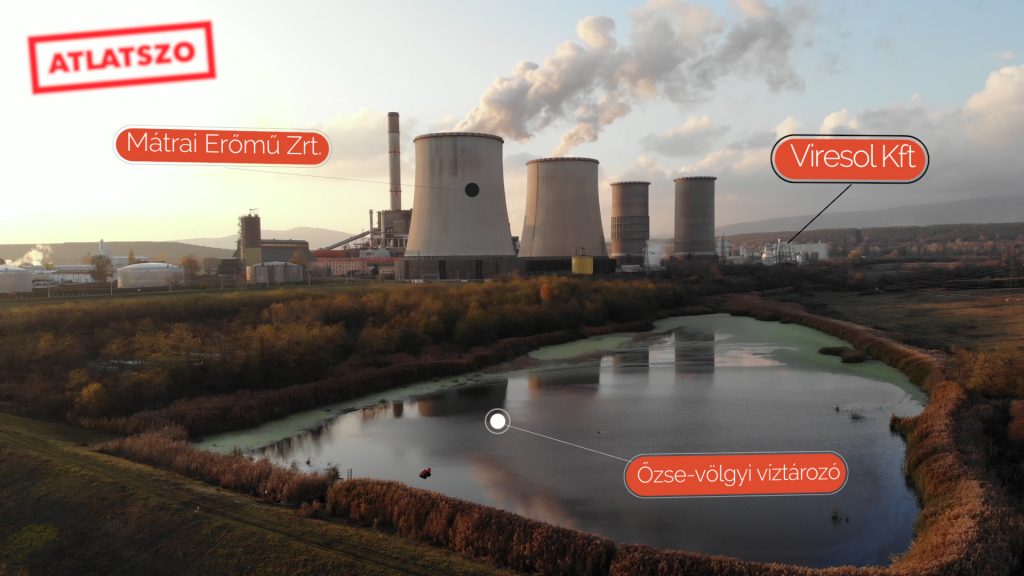The https://english.atlatszo.hu use cookies to track and profile customers such as action tags and pixel tracking on our website to assist our marketing. On our website we use technical, analytical, marketing and preference cookies. These are necessary for our site to work properly and to give us inforamation about how our site is used. See Cookies Policy
Lőrinc Mészáros’ starch factory polluted the water reservoir of the Mátra Power Plant
Visonta-based Viresol filed a lawsuit against Atlatszo when we first reported about their pollution in November, which caused toxic gas leakages at the Mátra Power Plant, where several workers became ill. Atlatszo now obtained a recent decision of the Hungarian Disaster Management Authority which confirms our findings: the authority bans Viresol from further use of the Őzse Valley Water Reservoir, and obliges the private company to develop a wastewater management system in order to avoid further damage to the environment. Although Viresol was documented polluting the reservoir up until January this year, the decision of the authorities was kept secret.

The deadline of 31 August 2020 was given to Viresol, a wheat processor and member of the Opus Global Group which belongs to Hungarian billionaire Lőrinc Mészáros, to develop a wastewater management system that ”prevents the water drained from the site from entering the Őzse Valley Water Reservoir of the Mátra Power Plant”, Hungary’s largest coal-fired power station.
The authorities forgot to report the findings of their investigations to the public, despite the fact that the mysterious pollution cased an emergency situation in the Mátra Power Plant last year, with toxic gases leaking and several workers becoming ill. Atlatszo was first to report in November that hydrogen sulfide and nitrogen monoxide have been found in concentrations above the health limit and phosphine has also been detected in the gas leakages, and the source of the pollution is the tecnological water taken from the Őzse Valley water reservoir, a problem that has never been experienced before during the last half century of the operation of the thermal power plant.
However, in February 2019, a huge wheat processor and starch factory was started up on site next to the power plant, which discharges its industrial wastewater into the same water reservoir. Detected gases refer to anaerobic decomposition of large amounts of organic matter, which according to our local sources could only originate from the starch factory.
Toxic gases released at Mátra Power Plant, locals blame Lőrinc Mészáros’s starch factory
Hydrogen sulfide and nitrogen monoxide have been found in concentrations above the health limit and phosphine has also been detected in gas leakages at the Mátra Power Plant in Visonta, Hungary last week.
Viresol answered our questions about the serious and repetitive pollution with a lawsuit demanding the correction of our article and claiming there is no proof of their involvement in the emergency situation at the Mátra Power Plant. To put it mildly, the local authorities did not force themselves to investigate the case: the county police HQ asked to be excluded from the investigation into environmental damage.
Responding to our FOI request, the Heves County Disaster Management Directorate provided measurement reports on the gas pollution examined at the Mátra Power Plant. Official data proved that our information on the presence of hydrogen sulfide, phosphine, and nitric oxide was correct. However, it has not been disclosed since which of the two companies operating at the same Visonta site, Mátra Power Plant or Viresol caused the problem.
This was only made clear in the April decision of the Borsod-Abaúj-Zemplén County Disaster Management Directorate, which was kept secret from the public. Atlatszo obtained a copy of the official decree dated 9 April 2020 which obliges Viresol to take measures for the prevention of environmental damage and damage to surface waters.
According to the document, the results of laboratory measurements of water samples taken during official inspections, as well as the experience of on-the-spot inspections, show that the Viresol site regularly discharges untreated, high organic matter sewage that ends up in the Őzse Valley water reservoir. “It is clearly identifiable that the source of wastewater with a high concentration of organic matter is exclusively the site of Viresol, which deals with grain processing” – the official decree states.
The decision of the disaster protection authority also describes that “the activities of the Mátra Power Plant generate primarily inorganic wastewater on the basis of the permits. The wastewater of Viresol mixes with the used waters of Mátra Power Plant in the Őzse Valley reservoir, as a result of which harmful anaerobic processes with gas formation take place. As a result, Mátra Power Plant is not able to utilize the water of the Őzse Valley reservoir as technological water due to its deterioration”.
Katasztrofavedelem vs Vires… by atlatszo on Scribd
The Disaster Management Authority obliged the starch factory to ensure that the necessary treatment of the contaminated water generated at the site is carried out to the required extent with the transformation of the operating technical solutions – including the establishment of a new water treatment plant. Viresol was also obliged to release treated waters by bypassing the Őzse Valley reservoir, effectively banning it the further use of the water reservoir.
According to the decision of the Disaster Management Authority, “the implementation of measures to prevent environmental damage can not be postponed” and therefore the authority declared its provisions immediately enforceable, regardless of legal remedy.
Although the toxic gas leaks and the resulting emergency situation the Mátra Power Plant caused a great deal of public outrage last year, Hungarian authorities did not publicly name those responsible. The decision just described was also kept secret and was obtained by Atlatszo from an unofficial source. We filed a FOI request with the Borsod-Abaúj-Zemplén County Disaster Management Directorate to officially publish the results of its investigation.
The contaminated Őzse Valley water reservoir was shared by two companies with the same owner: Mátra Power Plant and Viresol were both owned by Opus Global controlled by Felcsút billionaire Lőrinc Mészáros. However, in a deal what was widely seen as disadvantageous for the buyer, Opus Global sold the money-losing power plant to the state owned energy holding company Hungarian Electricity Works last December.
Written by Tamás Bodoky. The more detailed Hungarian version of this article is available here.


